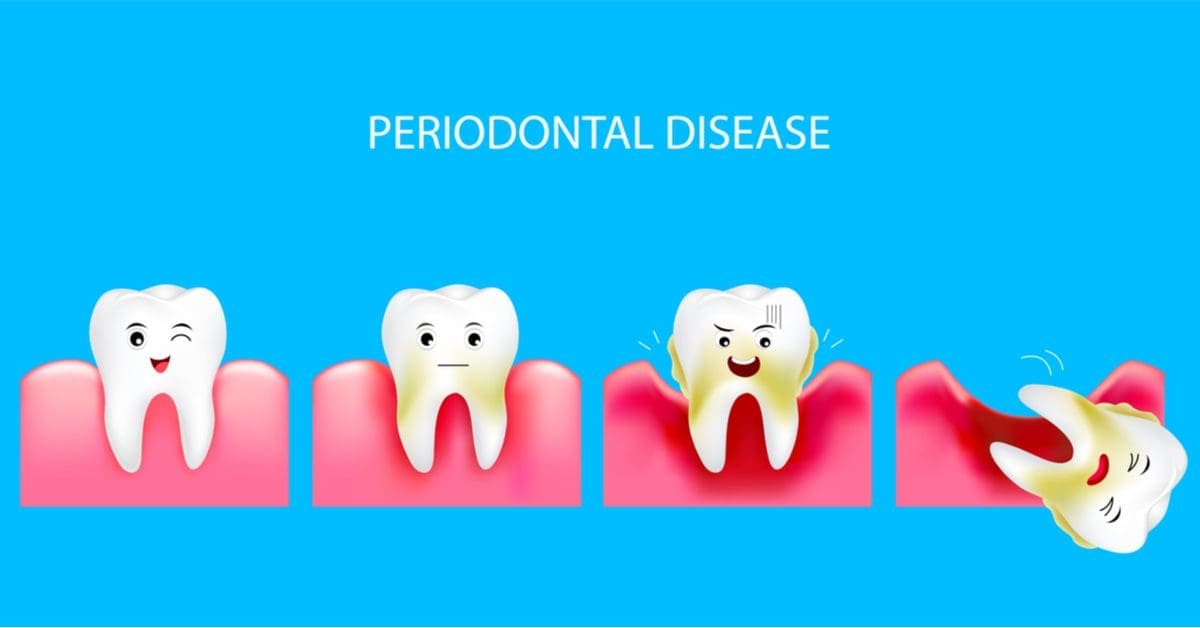Gum Disease
Gum disease is one of those insidious health conditions that is often ignored because it doesn’t necessarily cause pain or discomfort. It’s not like a cavity that will provide a dramatic reminder of its presence in the form of toothaches. Despite its relatively mild set of symptoms, gum disease can have irreversible consequences.
Gum disease is also referred to as periodontitis or periodontal disease. It is the result of unchecked bacterial growth and is the leading cause of adult tooth loss.
Gingivitis
Characterized by inflamed gum tissue, gingivitis is the product of plaque buildup along the gumline and on the surfaces of teeth. Gum disease starts with gingivitis, but gingivitis doesn’t have to turn into gum disease. Symptoms of gingivitis include bleeding while brushing or flossing.
The good news about gingivitis is that it is easily treatable. Despite the inflamed gums, the teeth are still secure, and there is no damage to bone and other supporting tissues. A professional dental cleaning, combined with positive changes in dental hygiene habits, can usually reverse the condition. If changes are not made, it is likely to progress into periodontal disease.
Periodontitis
As the later stage of gum disease, periodontitis has a more severe set of symptoms. For example, it can cause a loss of bone and other tissues. In the mouth of a person with periodontitis, the gum recedes from the teeth and leaves spaces where food debris can collect and cause infections. The toxins produced by bacteria in these spaces can break down the bone that keeps teeth in place. Over time, the connective tissue that holds teeth fixed in their sockets is lost.
Patients who are already dealing with bone and tissue loss may be referred to a periodontist by their dentist. A periodontist is a specialist with a more extensive set of treatment procedures at their disposal. Treatments include scaling and root planing. Scaling involves scraping away the plaque and tartar around the gum line. Root planing is the smoothing of rough areas on the roots of teeth. When the roots are smooth again, it gets rid of places for bacteria to hide and leaves a smooth, clean surface so that the gums can attach to the teeth.
Contributing Factors
Inadequate dental hygiene is the most common cause of gingivitis and gum disease, but other issues can make it worse, including:
Lifestyle
Smoking can slow down the ability of gum tissue to heal. Poor nutrition and obesity have also been shown to increase the risk of gum disease by limiting the body’s ability to stave off infections.
Genetics
The tendency to develop gingivitis can be inherited. Even if they exercise good oral hygiene habits, individuals with family histories of gum disease may still get it.
Illness
Any illness that affects the immune system can increase the risk of developing gum disease. Inflammatory conditions like diabetes and rheumatoid arthritis can affect the gum and make gum disease worse.
Medications
Saliva protects the gums and teeth. Medications that cause mouth dryness will remove that protection and can cause gum disease.
Hormones
The hormonal changes that occur during pregnancy, menopause, and menstruation can make a woman more susceptible to gum disease.
Regular dental checkups are essential to diagnosing gum disease while it is still easy to treat. It is also crucial to be aware of the causes so that it can be prevented.
Are you looking for a dentist who can help you with your gum disease issues? You are at the right place.
Contact Dr. Paul Feldman at Suburban Essex Dental in West Orange, NJ, in Essex County to learn more about gum disease, gingivitis, and periodontal disease. For the past eight years, New Jersey Monthly has voted Dr. Feldman one of the top dentists in the state of New Jersey.
Due to the current coronavirus situation, Dr. Paul Feldman is providing, online dentistry with virtual dental consultations. Learn more about how to schedule your virtual dental consultation here.







